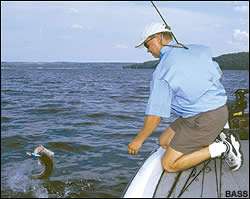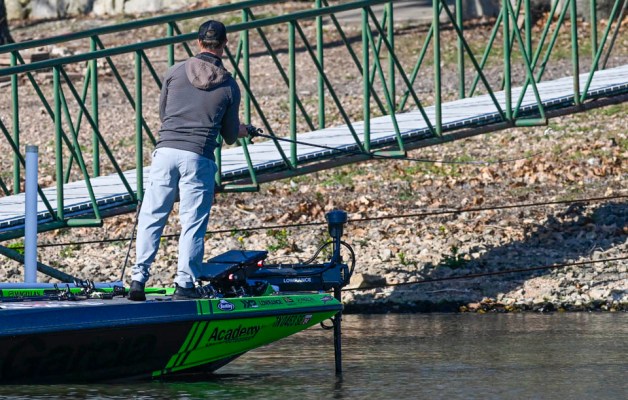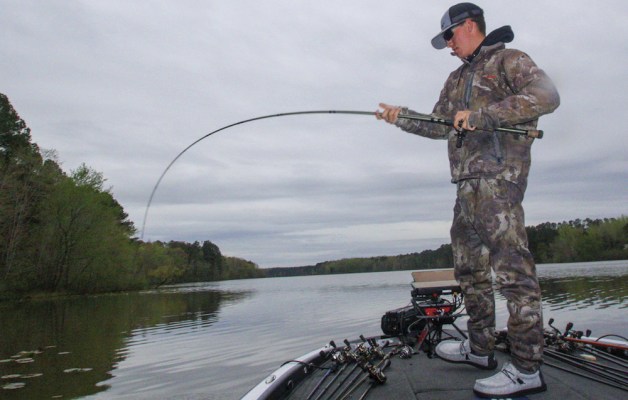
Tim Horton crossed the weigh-in stage on Day 1 of the 2001 New Orleans BASS Masters Classic without a fish. For professional anglers, blanking on any tournament day is painful; blanking on a Classic tournament day is like a 5/0 hook in the heart.
However, this was not the first time Horton had zeroed in Classic competition. In fact, to this point in his career, he had never weighed in a Classic keeper. The previous year, after dominating the BASS Angler-of-the-Year race as a rookie, Horton never weighed in a single bass at the 2000 Chicago Classic.
When the sensitive subject of going fishless in another Classic was broached, Horton offered no excuses for his four mother-of-all-goose-eggs in a row. "I fish the Classic to win," commented Horton. "In order to do that, you have to ignore the conventional water and stay committed to finding untapped places or patterns — something others have missed. If you never find that water, a zero can happen."
Horton was unfazed by his Classic shortcomings because he has made a handsome living — claiming two BASS Tour titles — by focusing on what he calls bassing "blind spots."
"Finding blind spots takes a bit of reverse psychology and a lot of discipline," explains Horton. "You have to pattern the fish and the fishermen. You identify the best-looking water, and then you ignore it. I learned this concept by studying other BASS Masters Classic victories.
"George Cochran's win on Lay Lake in 1996 and Denny Brauer's championship on High Rock in 1998 are two perfect examples of blind spots. Both lakes are good fisheries, but they are small and receive a lot of fishing pressure. George and Denny uncovered blind spots — places local anglers did not fish during that time of year."
Fishing with this approach, it is no coincidence that Horton's two BASS Tour victories have some striking similarities.
At the Potomac River in 1999, Horton knew he could catch plenty of 2-pound bass from the river's well-known hot spots. But Horton was convinced that the bigger fish lived offshore. For two practice days, he spent his time idling around in open water, watching his depthfinder for something different.
"I fished a lot of 'dead' water in practice," admits Horton. "But that's the key to finding blind spots — you have to commit to fishing obscure places."
With the help of a few diving gulls, Horton finally found exactly what he was looking for — an untapped blind spot. For four days he worked a mother lode of large Potomac River bass to compound 77 pounds, 8 ounces. His margin of victory was nearly 16 pounds, all from one offshore ridge near the launch site.
At Lake Toho in December 2001, Horton experienced a bit of Potomac River déjà vu. From past experience on Toho, he knew where the traditionally good places were. He also knew that much of the field would be competing on those limited spots. So Horton committed himself to fishing dead water.
"The blind spot at Toho was created by muddy water," recalls Horton. "Everyone knows that turbid water in Florida can shut down the bite — it is dead water until the clarity improves. A large portion of the lake was muddy, and no one would fish it. I decided to spend my time seining that part of the lake. I knew if I could find something within that area, I would have it to myself."
His diligent search turned up a group of isolated hydrilla mats that held big fish. During the tournament, he took big bass honors two days in a row with an 8-2 and an 8-3. Those two Florida heavyweights anchored Horton's impressive total of 61 pounds, 4 ounces, almost 18 pounds greater than the second place weight.
"At Toho, there wasn't a bunch of fish in one area, like there had been on the Potomac, but the fish were positioned in a very predictable manner. Having them all to myself made it possible for me to win."
At both venues, Horton discovered untapped blind spots that yielded huge winning margins. He also points out some other key similarities in the two events.
"Both tournaments were on heavily fished waters with a lot of past tournament history," he says. "Boats were stacked up on top of one another, fishing 'community holes.' The only chance to win was to find something nobody else was fishing."
Horton reminds anglers that even though locating such a spot can be a bassing gold mine, searching for the right area is a real gamble.
"I have spent many practice days looking for blind spots — without a payoff," he says. "When you invest all of your practice time looking for such a spot, and it doesn't pan out, it can be painful. Just look at my Classic record," he jokes.
BASS pro Randy Blaukat also has a reputation for finding blind spots, specifically ones that are a physical challenge to access. Blaukat has collected a dozen top BASS finishes, including two titles, by digging, sawing, jumping or sinking his way past ditches, trees, sandbars and bridges.
Such extreme measures, however, are not usually an option. Blaukat admits that opportunities to physically isolate himself from the field are rare. Instead, he tries to isolate himself from his competitors by finding unused tactics.
"Blind spots are not just areas," says Blaukat. "It can be a matter of going against the grain. The concept applies to bait selection, seasonal patterns or boat positioning — even a single object on a lake can be a blind spot."
Blaukat's poignant lesson about contrarian strategies in lure selection came during the 1992 Grand Lake Invitational, when he was stunned by the tournament's winning pattern.
"It was November, and the biggest cold front of the season was blowing through," he recalls. "The daytime temperatures barely got above 40 degrees, and at times, it sleeted. The water temperature was 52 degrees. Everyone was throwing the traditional cold water lures — jigs, plastics and slow crankbaits. Jim Morton blew the field away on a buzzbait fished in a foot of water. That opened my eyes to blind spots in lure selection."
Since then, Blaukat has discovered a few offbeat lure tricks of his own. For example, common lore claims that a heavy jig with a pork frog is good only in the cold winter months. "It works pretty good in the dog days of summer, too," he adds.
Blaukat contends that a particular lake's fishing history and local information create blind spots. "People are always under the assumption that pros want local information so we can go fish the exact same spots with the exact same baits," says Blaukat. "I am interested in local information to find out popular baits and places that create potential blind spots that exist because of local knowledge."
Blaukat points to a recent near-win at the 2002 BASS Tour stop on Alabama's Lake Eufaula as an example. The tournament was held in late May, a time when traditional knowledge says fish are out on the ledges and can be caught only on crankbaits or Carolina rigs.
"I went up the river and flipped a jig in 2 feet of water," counters Blaukat. "I had the whole area to myself and finished second. Denny Brauer won the tournament by doing the same thing. That tournament highlighted a seasonal blind spot."
Blaukat also likes to find cover objects that are ignored by recreational anglers. Even obscure objects, such as a barge tie-up or a channel marker, can serve as a blind spot for the creative Missouri pro, who once finished high in a tough BASS event by fishing only channel markers and buoys.
He is particularly mindful of that when fishing docks. On heavily pressured lakes, he looks for objects to fish between the docks.
"There are blind spots within the way anglers position their boats," he says. "This is especially true on metal floating docks with cables that can scratch boats. Many anglers will stay well away from these docks when fishing them. Watch 10 different local anglers fish docks, and their boat positions will likely be the same. Positioning the boat differently — maybe going under the cables — uncovers a whole series of new casting angles."
Both Horton and Blaukat say blind spots also occur when prevailing weather conditions change. "Hard winds can blow from a certain direction for several days in a row, forcing anglers off some areas and into others," says Horton. "When that wind changes, blind spots exist in places that (previously) were unfishable."
Blaukat says the same dynamic exists for the upper reaches of rivers and creeks. Drenching rains can flush these places out for several days, making them unfishable. But when the water subsides and the upper portions start to clear, bass will often turn on. And anglers who see only muddy water rolling out of the tributaries won't bother to try the headwaters.
Horton contends that some of the best blind spots are often nestled within well-known areas of a lake.
"Again, using a Classic as an example, look at where Rick Clunn won the 1984 Classic on the Arkansas River — with a 25-pound margin — in Slack Water Harbor. That is one of the most popular fishing pools on the river, with plenty of shoreline cover, but Clunn found a subtle drop just offshore, and he had a heyday."
Horton says release sites for tournaments are notorious for having blind spots. "Marinas and parks that host tournaments usually have a lot of obvious cover, including riprap, docks and ramps — all of which receive plenty of fishing pressure. I look for things that are adjacent to the site, yet inconspicuous, such as swim beaches, seawalls or submerged cover."
Horton's biggest secret to finding bassing blind spots is to scour massive offshore flats for overlooked features. The Alabama pro spends literally hours of practice time idling around on flats with a marker buoy in his lap and his eyes glued to a flasher depthfinder. When he finds anything that makes his flasher return something other than a solid blip frozen at a single depth, he tosses out a marker and blitzes the water with a variety of lures.
He often pursues this process dozens of times a day, to no avail. However, when he finally scores, the payoff can be huge.
"Maybe someday I'll uncover one of those blind spots in a Classic," says Horton. "Then those four goose eggs won't seem so bad."




